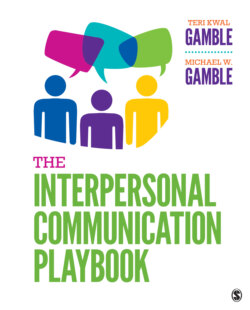Читать книгу The Interpersonal Communication Playbook - Teri Kwal Gamble - Страница 83
На сайте Литреса книга снята с продажи.
Reactions to You: Confirming, Rejecting, and Disconfirming Responses
ОглавлениеAs we interact with others, how we feel about ourselves changes. Some people we interact with provide confirmation of our opinion of ourselves, communicating with us in ways consistent with our own appraisal of ourselves. How they treat us during our interactions with them reflects the way we think we are. For example, if you believe yourself to be intelligent, confirmers might reflect this by asking you to tutor them.
Others with whom we interact signal rejection of our self-appraisals by treating us in ways inconsistent with our sense of self—whether that is good or bad. For example, if you believe yourself to be hardworking, but rejecters treat you as if you are lazy, over time, their treatment of you might cause you to revise your picture of yourself.
Still others provide disconfirmation of our self-appraisals by sending us messages that tell us that, as far as they are concerned, we are not even important enough for them to think about; in their eyes, we do not exist—we are irrelevant. Someone who disconfirms you ignores you and goes about her business as if you were not present. By treating other human beings like nonentities, consistent disconfirmers may eventually rob others of their sense of self, without which it becomes virtually impossible for them to relate to the world effectively.27
Thus, those around us help shape our self-concepts in both positive and negative ways. Virtually every interpersonal contact we share sends a message regarding our importance, our capabilities, and how others view both our potential and our inadequacies.28 (See Table 2.3.)
Table 2.3
